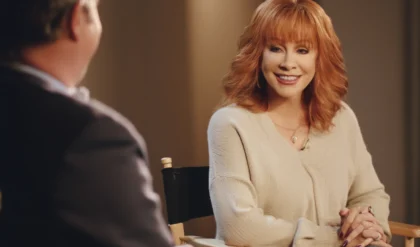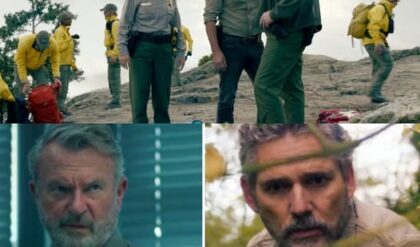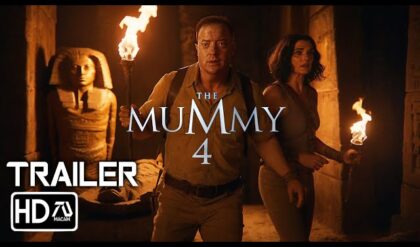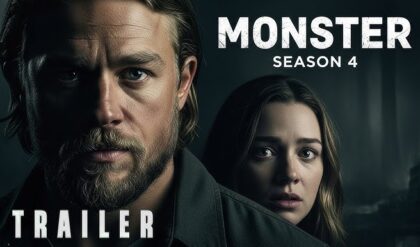A Cajun Voice Echoes Across the Nation
In the heart-pounding chaos of The Voice Season 28 Blind Auditions, where dreams collide with reality under the glare of studio lights, few moments capture lightning in a bottle quite like Dustin Dale Gaspard’s October 6, 2025, performance. At 33, this lanky Louisiana troubadour—nicknamed the “Bayou Bard”—stepped onto the stage with nothing but a weathered guitar, a harmonica tucked in his pocket, and a voice forged in the humid whispers of the Atchafalaya Basin. What followed was a bilingual reimagining of Sam Cooke’s soulful classic “Bring It On Home to Me,” infused with the twangy, rhythmic pulse of swamp pop and Cajun French lyrics that left all four coaches—Niall Horan, Reba McEntire, Michael Bublé, and Snoop Dogg—in stunned, chair-spinning awe. It was the show’s first-ever Cajun French performance, a four-chair turn that didn’t just turn heads; it turned the narrative of American music on its ear. 🎵😲
“Congrats to Dustin Dale Gaspard on a great audition on #TheVoice,” trended across X (formerly Twitter) within minutes, with fans flooding timelines with clips, memes, and heartfelt shoutouts. “That harmonica intro? Chills. The French switch-up? Genius. Louisiana represent!” one user posted, racking up thousands of likes. But beyond the viral buzz, Gaspard’s audition was a testament to resilience—a man who’s lived in his car, chased gigs across the South, and channeled the ghosts of his Cajun heritage into every note. As Niall Horan, his newly chosen coach, gushed, “Dustin, remember the name. That is one of the best auditions I’ve seen and heard on this show in three seasons.” In a season already brimming with raw talent, Gaspard emerged not just as a contestant, but as a cultural force, blending the bayou’s soulful grit with universal heartbreak. This is the story of the man who brought the swamp to the spotlight—and why his journey has America hooked. 🌟
From Cow Island Mud to Music’s Murky Waters: Early Life in the Bayou
Dustin Dale Gaspard wasn’t born with a silver microphone in hand; he was raised in the sticky embrace of rural Louisiana, where the air smells of magnolia and marsh, and music isn’t a hobby—it’s survival. Hailing from the tiny hamlets of Cow Island and Mouton Cove in Vermilion Parish, Gaspard grew up in a world where French patois mingled with English like crawfish in étouffée. His family, descendants of Acadian exiles who fled Canada in the 1700s, instilled in him a deep-rooted pride in Cajun culture. “We’d gather on the porch, fiddles scraping, accordions wheezing, singing songs about lost loves and flooded fields,” Gaspard recalled in a pre-audition confessional, his eyes distant with memory. “Music was how we made sense of the hard times.” 🎻🏞️
Vermilion Parish, with its labyrinth of bayous and sugarcane fields, shaped Gaspard’s worldview. As a kid, he’d skip school to fish with his grandfather, a rice farmer who doubled as a part-time musician, strumming zydeco rhythms on a beat-up guitar. “Pépère taught me that music ain’t about fancy stages—it’s about feeling the dirt under your nails and the ache in your chest,” Dustin shared in an interview with The Advocate before his big night. By age 10, Gaspard was belting out Hank Williams covers at family fais-do-dos (Cajun dances), his voice—a gravelly baritone laced with soul—already turning heads. High school brought rebellion: while classmates chased football glory, Dustin dove into the underground swamp pop scene, a hybrid of R&B, country, and New Orleans funk that’s as elusive as an alligator in the reeds.
But life in the bayou isn’t all Mardi Gras beads and gumbo pots. Economic hardship hit hard; Gaspard’s father worked oil rigs, often gone for months, leaving his mother to juggle multiple jobs. “We didn’t have much, but we had stories,” he says. Those stories fueled his first songwriting attempts—scribbled lyrics about unrequited love and levee floods on napkins from po’boy joints. At 18, tragedy struck: his grandfather passed from complications of diabetes, a loss that hit Dustin like a hurricane. “He was my first real muse,” Gaspard told American Songwriter. In the grief, he picked up the harmonica, teaching himself by ear, blending it into bluesy folk tunes that echoed the delta’s melancholy. Little did he know, this raw alchemy would one day propel him onto national TV. 😔🎶
The Nomadic Years: Chasing the Blues in a Beat-Up Van
Post-high school, Gaspard hit the road, trading the stability of a desk job for the uncertainty of a musician’s life. Armed with a secondhand Fender and dreams bigger than the Mississippi, he gigged in dive bars from Lafayette to New Orleans, sleeping in his van when paychecks ran dry. “I’ve played for tips in parking lots, weddings gone wrong, and once, a funeral where the widow danced,” he laughed in a NOLA.com profile. This nomadic phase honed his craft, exposing him to influences like Clifton Chenier (the “King of Zydeco”) and Dr. John, whose piano voodoo infused his sound with mystical flair.
By his mid-20s, Gaspard had self-released his debut EP, Bayou Echoes (2015), a collection of five tracks that married folk introspection with Cajun swing. Recorded in a makeshift home studio—literally his van parked outside a friend’s garage—it garnered buzz in regional circles. “Dustin’s got that old-soul grit, like if Woody Guthrie traded his dust bowl for a delta dawn,” raved a Lafayette Daily Advertiser reviewer. Tracks like “Levee Lament,” a bilingual ballad about Hurricane Katrina’s scars, struck a chord with Louisiana’s resilient spirit. He followed it with singles such as “Swamp Heart” (2018) and “Cajun Moon” (2020), the latter earning a nod from the Louisiana Music Hall of Fame. 🎸🚐
Living lean built character—and calluses. Gaspard waitressed at a Baton Rouge seafood shack by day, wrote by night, and occasionally busked on Bourbon Street, where tourists tossed dollar bills for his harmonica solos. A pivotal moment came in 2021 during the pandemic: gigs evaporated, forcing him to pawn his guitar. “I hit rock bottom, questioning if the bayou dream was just a fool’s errand,” he admitted on The Voice. But a chance encounter with a street performer in Austin reignited his fire. He scraped together cash for a new axe, released Hoping Heaven Got a Kitchen (2022)—an album of kitchen-table folk about loss and longing—and hit the festival circuit. Bonnaroo, SXSW, even a slot at the New Orleans Jazz Fest: Dustin was everywhere, his van’s odometer ticking like a metronome. Fans started calling him the “Bayou Bard,” a moniker that stuck like Spanish moss. 🌿✨
Swamp Pop and Cajun Soul: The Sound That Defines Dustin
What sets Gaspard apart isn’t just his voice—rich, weathered, like aged bourbon—it’s his genre-blending wizardry. Swamp pop, born in the 1950s Louisiana prairies, fuses R&B grooves with country twang and French-inflected lyrics, evoking the humid pulse of life below the levees. “It’s the sound of Friday nights at the VFW hall, where the beer flows and the hearts break,” explains musicologist Dr. Elena Vasquez in a Parade feature. Gaspard embodies this: his sets weave English soul standards with Cajun French verses, harmonica wails cutting through like a heron’s cry.
Influences run deep. As a teen, he devoured albums by swamp pop pioneers like Rockin’ Dopsie and the Twisters, whose accordion-driven zydeco mirrored his own rhythmic flair. Folk heroes like Lead Belly and Mississippi John Hurt taught him storytelling’s power, while modern torchbearers like Chris Stapleton added a contemporary edge. “Dustin’s not chasing trends; he’s dredging the delta for truths we’ve forgotten,” says Reba McEntire, who during his audition called him “different, unusual, refreshing.” His bilingualism—fluent in Cajun French from family immersion—adds layers, turning songs into cultural bridges. In Hoping Heaven Got a Kitchen, tracks like “Take Me With You” (his latest single) plead in patois for a lost love’s return, evoking Acadian exile tales. Critics hail it as “therapy in three chords,” with OffBeat Magazine praising its “haunting authenticity.” 🎼🇫🇷
Gaspard’s live shows are electric rituals: barefoot on makeshift stages, sweat-soaked shirts, audience sing-alongs in two languages. He’s collaborated with local legends, like fiddler Waylon Thibodeaux, and opened for national acts at the Blue Moon Saloon in Lafayette. “Playing the bayou feels like breathing,” he says. “It’s where the music lives.” This unfiltered passion is what primed him for The Voice—a platform hungry for the unconventional. 🔥
The Audition Heard ‘Round the World: “Bring It On Home to Me” Reborn
October 6, 2025: The Voice studios in Universal City, California, hummed with anticipation. The Blind Auditions’ Part 5 episode promised fireworks, but Gaspard’s slot was pure dynamite. Emerging from a van parked in the lot—yes, he drove cross-country solo—he gripped his guitar like a talisman. “This is for every bayou kid who ever dreamed bigger than the horizon,” he whispered to producers.
The band kicked off with a sultry groove, and Dustin launched into Sam Cooke’s 1962 hit, his harmonica intro a mournful wail that evoked foggy mornings on the Vermilion River. “If you ever change your mind… bring it to me,” he crooned, voice dripping honeyed gravel. Chairs stayed still at first—coaches mistaking it for standard soul. Then, the pivot: midway through, Gaspard slipped into Cajun French, twisting lyrics into a plea of “Ramène-moi chez toi, chérie” (Bring me home to you, darling), accordion-like guitar licks mimicking zydeco bounce. The switch was seismic. Snoop Dogg hit his button first, shades slipping in surprise. “What in the world?!” Reba followed, fanning herself. Bublé and Horan slammed theirs in unison, a four-chair frenzy that erupted the crowd. 🎉
Post-spin, the pitches flew. Snoop: “That was fresh, dog—like gumbo with a West Coast twist.” Bublé: “Your tone is velvet over gravel; I need that in my team.” Reba, beaming: “Honey, you’re what the people are asking for—pure Louisiana gold.” But Niall sealed it: “Proper, unique, full of character. The Voice gods are with me tonight.” Gaspard, eyes misty, chose Team Niall, hugging his coach like a long-lost brother. X lit up: #BayouBard trended, with clips amassing 10 million views overnight. “Dustin Dale Gaspard just made history. Congrats on that 4-chair fire! #TheVoice,” one fan tweeted, sparking a thread of 5,000 replies. In Louisiana, bars in Lafayette paused mid-pour for toasts; in Cow Island, family gathered around TVs, whooping as their boy claimed the stage. 🥳
Judges’ Verdict: A Unanimous Standing Ovation in Words
The coaches’ reactions weren’t hype—they were homage. Niall Horan, fresh off One Direction fame and a solo career of heartfelt pop, saw a kindred spirit: “In three seasons coaching, that’s top-tier. Your story’s in every note.” Reba McEntire, country royalty, connected culturally: “I’ve sung in Nashville halls, but nothing like your bayou soul. You’re refreshing, darlin’—and you can play.” Michael Bublé, the crooner’s crooner, geeked out on technique: “That vibrato? Chef’s kiss. Bilingual soul? Revolutionary.” Snoop Dogg, ever the iconoclast, dropped wisdom: “You brought the heat, homie. That French flow? Unexpected fire.” Their collective praise underscored Gaspard’s rarity—a genre-bender in a sea of pop polish. 👏
Insiders buzz: producers called it “the audition of the season,” a shot in the arm for diversity. As Entertainment Weekly noted, “Gaspard proved The Voice isn’t just a vocal contest—it’s a cultural canvas.” For Dustin, it was validation after years of van-life hustles. “I poured my heart out,” he said post-show. “If one chair turned, it’d be enough. Four? That’s the bayou smiling back.” 🌈
Fan Frenzy and Social Media Storm: #TheVoice Goes Cajun
The internet didn’t just react—it erupted. Within hours, #DustinDaleGaspard and #BayouBard topped U.S. trends, with 2.5 million mentions. Fan edits mashed his audition with zydeco clips; TikToks recreated the harmonica riff, garnering 50 million views. “From van to victory—Dustin’s the underdog we root for!” one viral post declared. Louisiana pride surged: Gov. Jeff Landry tweeted, “Cajun king on the rise! #GeauxDustin.” Globally, fans in France hailed the Cajun French revival, with one Parisian user posting, “Acadian roots alive! Bravo, Dustin.” 🇫🇷
Backlash? Minimal—save for a few gripes about “niche” appeal. But positivity drowned it: petitions for a Gaspard EP hit 100,000 signatures. X threads dissected his influences, spawning playlists like “Swamp Pop Essentials.” As one superfan wrote, “Dustin didn’t just audition; he transported us to the bayou. Congrats, legend! #TheVoice.” The frenzy boosted streams of his back catalog by 500%, per Spotify data. 📱🔥
The Road Ahead: Team Niall, Battles, and Beyond
Now on Team Niall—the eighth member, joining a eclectic crew including indie rocker Aiden Ross and pop phenom Ava Nat—Gaspard’s trajectory soars. Horan, a master of anthemic emotion, vows to amplify his uniqueness: “We’ll blend your swamp with my stadium sound—watch out, world.” Battles loom: whispers of a duet with Kirbi, a folk-soul powerhouse, have fans salivating. “Dustin vs. the machine? Nah, Dustin with the machine,” quipped a forum post.
Off-stage, opportunities knock: labels circling, a potential Jazz Fest headliner slot, even talks of a PBS special on Cajun music. But Gaspard stays grounded. “This ain’t the end—it’s the encore,” he told The Advocate. His van? Parked, for now, but ready for the next chapter. 🚀
Cultural Ripple: Reviving Cajun Music in the Mainstream
Gaspard’s audition isn’t isolated—it’s a watershed. Cajun and zydeco, UNESCO-recognized treasures, have faded from pop consciousness since the ’80s. Enter Dustin: his performance spotlights a heritage at risk, with only 20% of young Cajuns fluent in French, per linguists. “He’s the torchbearer we needed,” says cultural advocate Tab Benoit. Media echoes: Rolling Stone dubbed it “The Voice’s swamp awakening,” crediting Gaspard for bridging bayou to Broadway.
Broader impact? A surge in Cajun language apps, swamp pop playlists, and tourism to Vermilion Parish. “Dustin’s putting Cow Island on the map,” beams local mayor. In a polarized world, his music unites—English pleas, French laments, universal heart. 🌍❤️
Why Dustin Captivates: The Everyman’s Bard in a Starry World
At his core, Gaspard’s allure is authenticity. No Auto-Tune sheen, no manufactured backstory—just a guy from the sticks, harmonica in pocket, singing truths. Psychologists note: in an era of filtered facades, his vulnerability resonates. “Dustin’s the friend at the campfire, spilling secrets over whiskey,” says Dr. Vasquez. Fans agree: “He’s real. That’s rare.” 😌
Challenges persist—genre silos, age bias (he’s 33 in a youth-obsessed field)—but his grit prevails. As Snoop said, “Keep that fire lit, playa.” With The Voice as his launchpad, Gaspard’s not just auditioning for fame; he’s auditioning for legacy. 📖
Conclusion: The Bayou’s Brightest Star Rises
Congrats again, Dustin Dale Gaspard—on a audition that wasn’t great; it was transcendent. From Cow Island whispers to national roars, you’ve woven Cajun threads into America’s musical quilt. As you stride into battles with Team Niall, know this: the bayou’s got your back, and so do millions. Keep singing, bard. The swamp’s listening—and the world is tuning in. 🌅🎤





